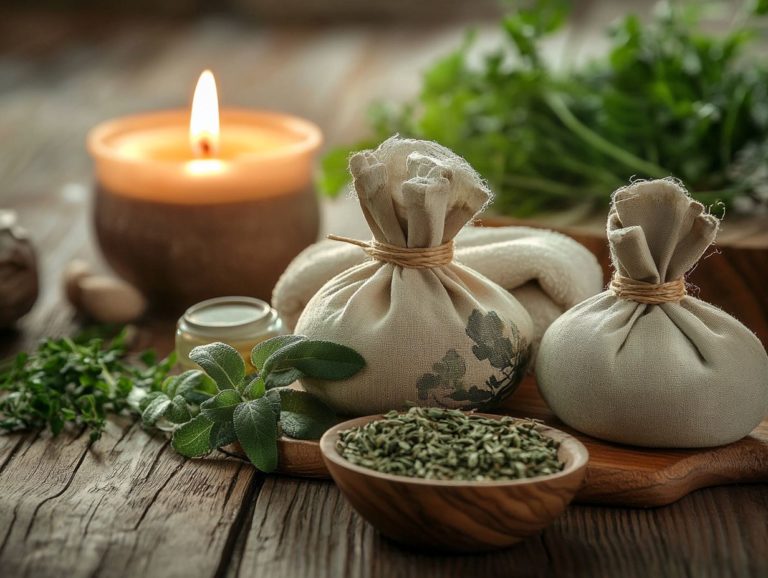What Are the Signs of Herbal Remedy Allergies?
Herbal remedies are becoming increasingly popular as natural alternatives for various health concerns. However, it s important to recognize that these remedies can sometimes trigger allergic reactions in sensitive individuals.
Understanding herbal remedies and the potential causes of these allergies is essential for their safe use. This article delves into common signs of allergic reactions, covering symptoms that may affect the skin, respiratory system, and gastrointestinal tract.
The article discusses how these allergies are diagnosed and provides insights into effective management strategies and alternative remedies. Continue reading to become an expert on navigating herbal remedies safely!
Contents
- Key Takeaways:
- Understanding Herbal Remedy Allergies
- Common Signs of Allergic Reactions to Herbal Remedies
- Diagnosing Herbal Remedy Allergies
- Treating Herbal Remedy Allergies
- Frequently Asked Questions
- What Are the Signs of Herbal Remedy Allergies?
- Can Herbal Remedies Cause Anaphylaxis?
- How Long Does It Take for Allergic Reactions to Herbal Remedies to Appear?
- Are There Any Common Herbal Remedies That Cause Allergic Reactions?
- What Should I Do If I Think I Am Having an Allergic Reaction to an Herbal Remedy?
- How Can I Prevent Allergic Reactions to Herbal Remedies?
Key Takeaways:
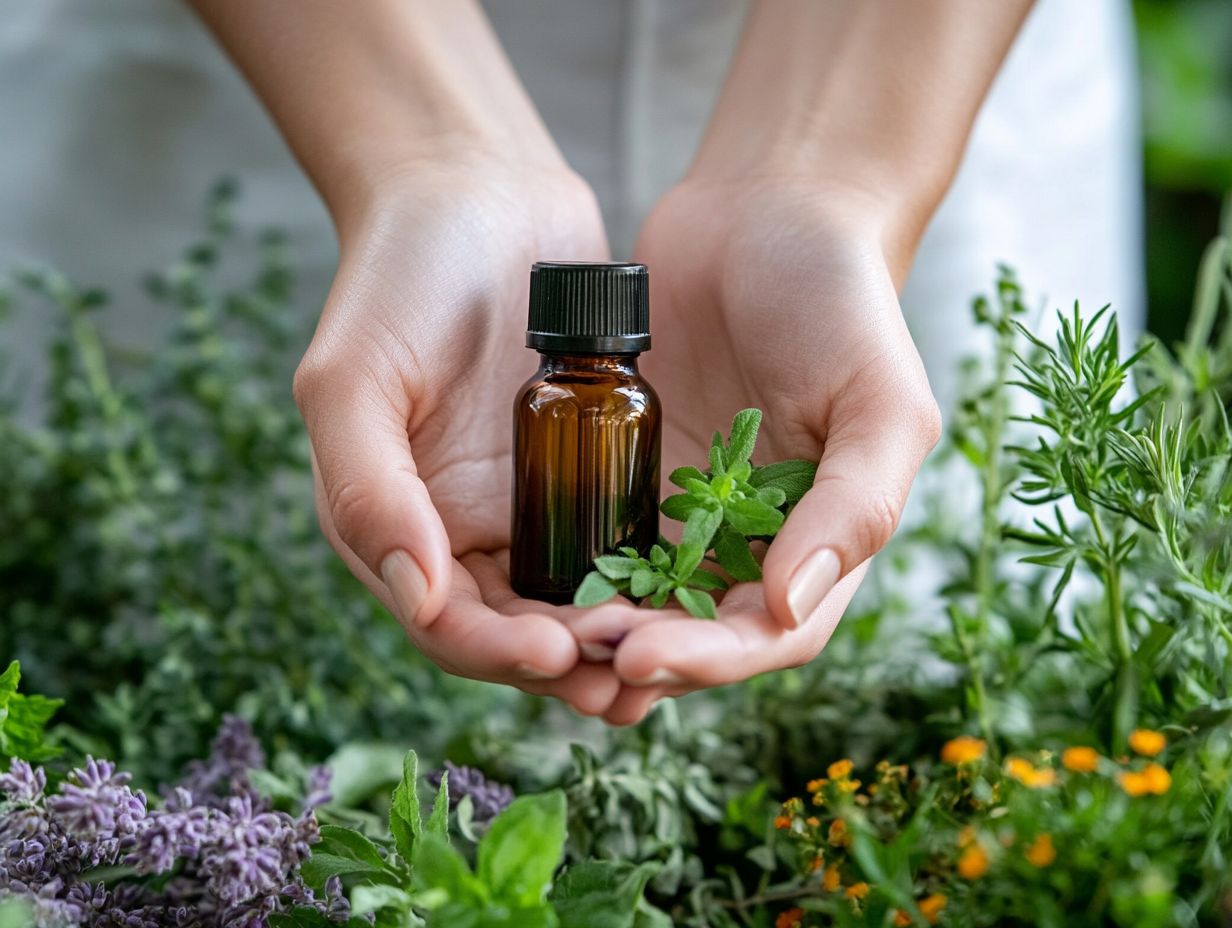
- Herbal remedies are natural products that can also trigger allergic reactions in some individuals.
- Skin, respiratory, and gastrointestinal symptoms are common signs of herbal remedy allergies to look out for.
- Allergic reactions to herbal remedies can be diagnosed through tests and exams and managed through alternative remedies or avoiding triggers.
Understanding Herbal Remedy Allergies
Understanding herbal remedy allergies requires recognizing how different natural treatments can affect individuals dealing with seasonal allergies or other allergic conditions. Herbal remedies like honey, quercetin, and stinging nettle are frequently used to ease allergy symptoms.
However, be aware that these remedies can also provoke adverse reactions in some individuals, potentially affecting their immune system and respiratory health. This dual nature of herbal treatments calls for deeper awareness, especially for those seeking relief from allergies while remaining mindful of possible side effects of herbal remedies.
What Are Herbal Remedies?
Herbal remedies are natural treatments derived from plants that have been trusted for centuries to enhance health and alleviate various ailments.
Throughout history, many cultures have embraced the healing properties of herbs, viewing them not merely as medicinal tools but as essential elements of holistic well-being. These remedies have evolved alongside traditional medicine, often serving as a bridge between ancient wisdom and contemporary practices.
Today, you may find yourself turning to herbal solutions to manage seasonal allergies, relying on substances such as:
- Honey for its natural antihistamine properties
- Quercetin as an anti-inflammatory agent
- Vitamin C to boost your immune function
- Probiotics to support gut health
Each of these components plays a crucial role in alleviating allergic reactions and enhancing your overall well-being.
How Do Allergic Reactions Happen?
Allergic reactions happen when your immune system mistakenly categorizes harmless substances like airborne allergens as threats, resulting in a strong reaction.
This process begins when you come into contact with an allergen, such as pollen, dust mites, or pet dander. Your body ramps up the production of Immunoglobulin E (IgE) antibodies. These antibodies latch onto mast cells, key players in your immune system, leading to the release of histamines and other chemicals. It s this release that brings about the familiar symptoms: sneezing, itching, and swelling.
Seasonal allergies tend to rear their heads at specific times of the year, especially in spring and fall, when pollen levels soar from trees, grasses, and weeds, exposing those who are susceptible to a veritable onslaught of allergens.
Common Signs of Allergic Reactions to Herbal Remedies
You may notice common signs of allergic reactions to herbal remedies in various forms, including skin reactions, respiratory symptoms, and gastrointestinal issues.
These symptoms can significantly affect your daily life, so it’s essential to stay vigilant and attentive to how your body responds.
In conclusion, understanding top herbal remedies for skin allergies is crucial for anyone looking to benefit from their natural healing properties. Always approach these remedies with caution, and consult with a healthcare professional if you suspect allergies.
Skin Reactions
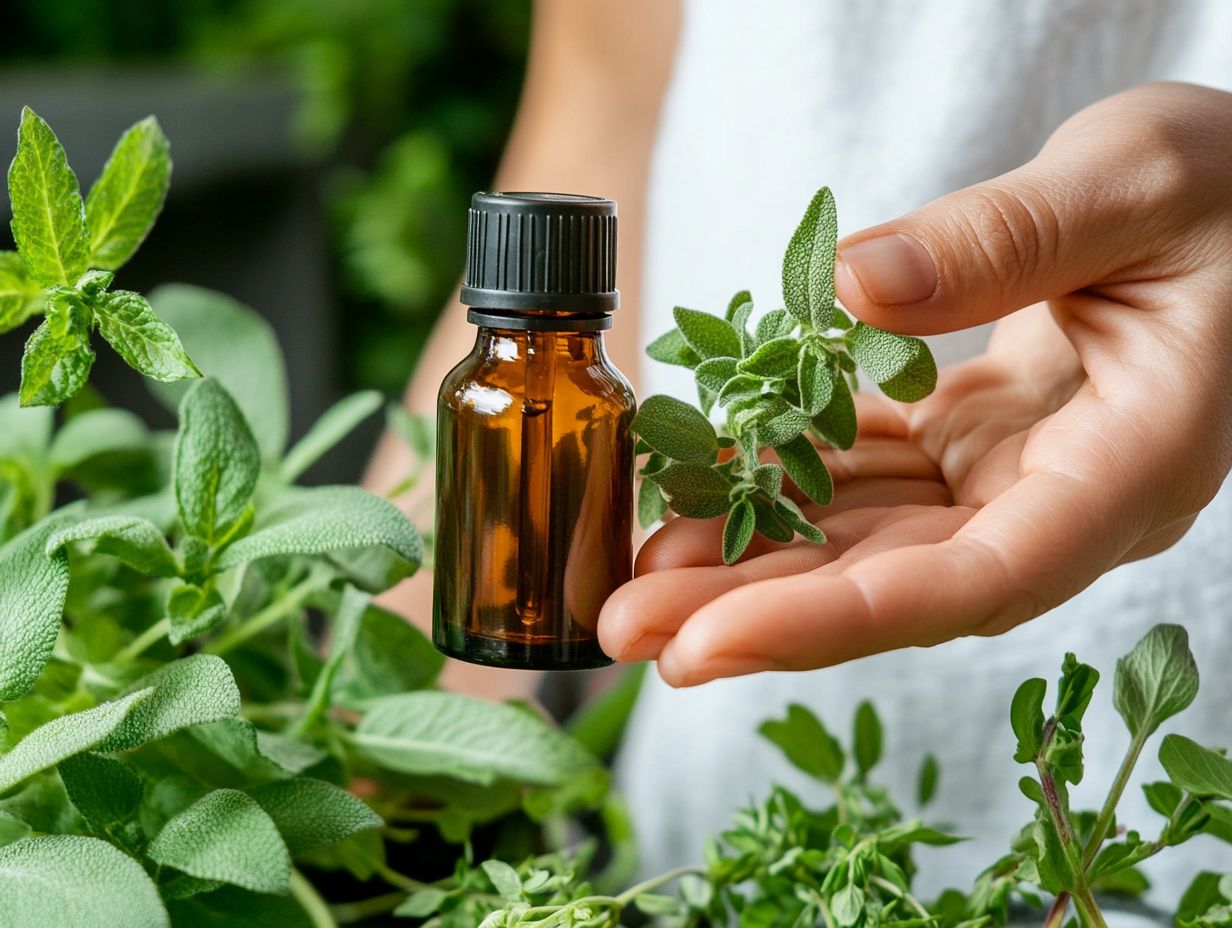
Skin reactions frequently emerge as a telling sign of allergic responses to herbal remedies. They often manifest as rashes, hives, or persistent itching.
These symptoms can strike unexpectedly after exposure, even if you’ve previously used the remedy without any adverse effects. For instance, you might find that using chamomile can lead to a rash due to a reaction to similar allergens, while another individual may develop hives after taking echinacea, known for its immune-boosting properties. It’s worth exploring whether herbal remedies can help with allergies.
Recognizing these specific skin reactions is essential for anyone contemplating herbal treatments. By identifying symptoms early, you can prevent more severe complications and make well-informed health decisions. It’s also important to be aware of the signs of herbal overdose to ensure your safety.
Respiratory Symptoms
Respiratory symptoms can emerge as a consequence of allergic reactions to herbal remedies. Issues such as nasal congestion, post-nasal drip, and wheezing can arise, making everyday activities increasingly challenging.
Allergic responses often ignite inflammation in the nasal passages and sinuses, causing significant discomfort and hindering normal breathing. For those facing these challenges, nasal irrigation and sinus rinses can serve as effective management strategies.
Regular use of these methods can significantly alleviate discomfort. This enhances overall respiratory health and enables individuals to better navigate the hurdles posed by respiratory allergies.
Gastrointestinal Symptoms
Gastrointestinal symptoms, including nausea, vomiting, or diarrhea, can sometimes emerge as allergic reactions to certain herbal remedies.
For example, St. John s Wort or echinacea might lead to discomfort in your digestive system. This can show up as bloating or cramps.
It’s essential to pay close attention to how your body responds after consuming these substances. Monitoring the onset and severity of any symptoms can offer valuable insights into potential intolerances or allergies.
By keeping track of these experiences, you can better inform your healthcare provider. This paves the way for a more personalized approach to future herbal use, promoting overall well-being and reducing the risk of severe reactions.
Diagnosing Herbal Remedy Allergies
Diagnosing herbal remedy allergies requires a meticulous approach. This encompasses a comprehensive medical history, a detailed physical examination, and a series of tests to pinpoint specific allergens.
Understanding your allergies is crucial! Each step is vital for accurate identification and effective management of your allergies.
How Are Allergies Diagnosed?
Allergies are diagnosed through a careful blend of assessing your medical history, conducting physical examinations, and performing skin or blood tests if necessary.
Your healthcare provider typically starts the diagnostic journey by gathering comprehensive details about your symptoms. This includes when they appear and any potential triggers.
This initial consultation helps establish a pattern that can direct further investigation. Next, a thorough physical examination may be performed to look for visible signs of allergic reactions.
If deemed necessary, skin prick tests or specific IgE blood tests can be carried out to measure your immune response to suspected allergens. Each of these steps is essential as they work together to ensure accurate identification of the allergens causing your symptoms.
Ultimately, this paves the way for effective management strategies.
Tests and Exams for Herbal Remedy Allergies
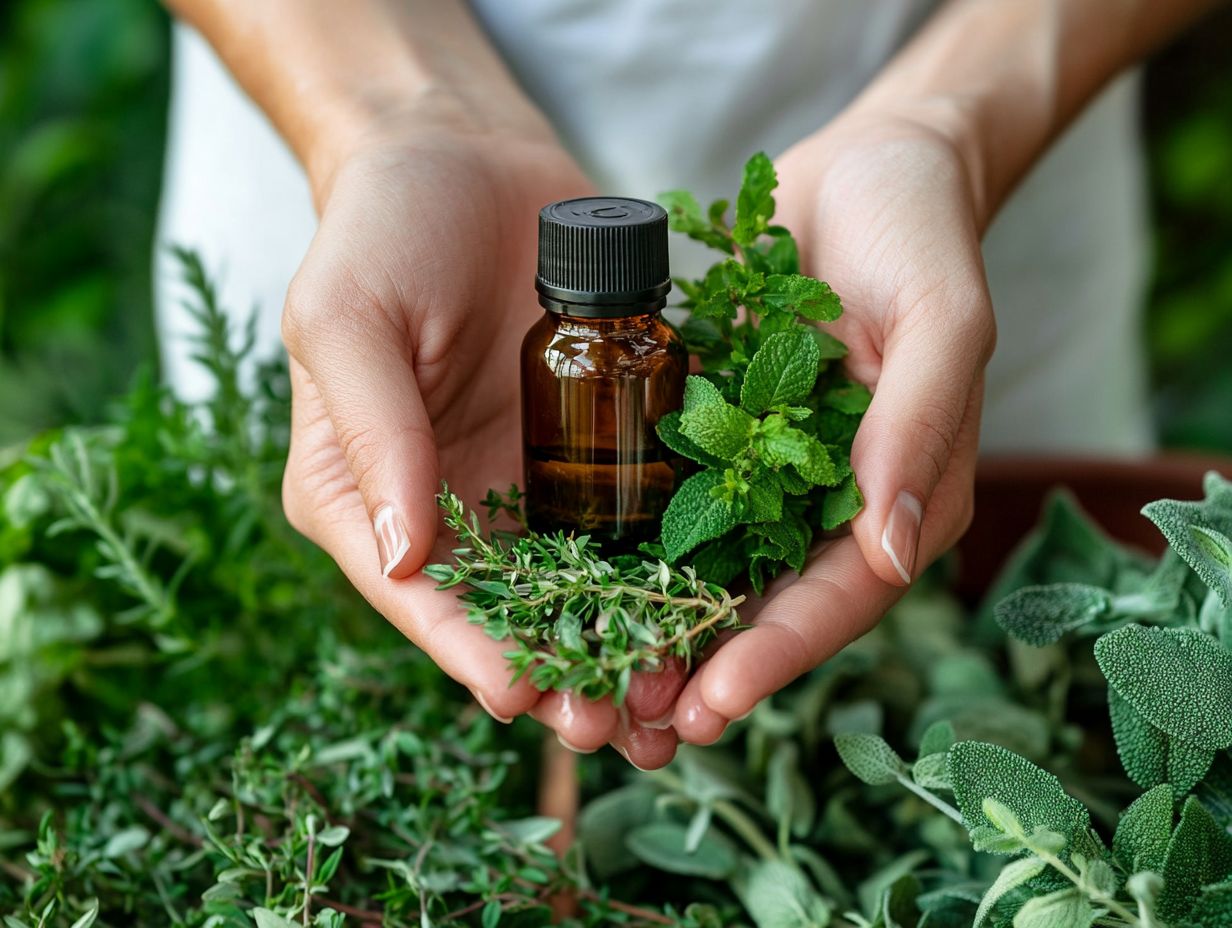
Various tests and exams, such as skin tests and blood tests, are employed to pinpoint the specific allergens causing your herbal remedy allergies.
These diagnostic methods are essential tools for identifying the precise substances that trigger adverse reactions in individuals like you. Skin prick tests offer immediate feedback by monitoring reactions to a range of herbal components. Blood tests measure specific antibodies linked to allergens.
Each method has its unique advantages. For instance, skin tests usually provide quicker results, while blood tests can offer a more comprehensive evaluation of a wider array of allergens.
The effectiveness of these tests can lead to tailored treatment plans, enabling you to make informed choices and avoid potential allergic reactions to herbal remedies in the future.
Treating Herbal Remedy Allergies
Addressing herbal remedy allergies calls for a combined approach that manages allergic reactions while exploring alternative natural remedies and considering traditional allergy medications. This approach ensures you are well-equipped to navigate the complexities of your allergies effectively.
Managing Allergic Reactions
Managing allergic reactions often involves using saline solutions and nasal irrigation techniques to alleviate symptoms. Nasal irrigation is a method to rinse the nasal passages to relieve congestion.
These methods are particularly advantageous for anyone dealing with nasal congestion, sneezing, or itchy eyes. You can also adopt lifestyle changes to minimize indoor allergens, such as regular cleaning and utilizing air purifiers, which can enhance your overall comfort.
At-home remedies like applying a warm compress or sipping herbal teas with anti-inflammatory properties may also help ease discomfort. Establishing a consistent routine with these strategies will help you significantly reduce the burden of allergic reactions in your life.
Alternative Herbal Remedies for Allergies
You may find relief with alternatives like honey, quercetin, and stinging nettle in the battle against seasonal allergies. These natural solutions have potential to ease discomfort associated with sneezing, itching, and congestion.
Local varieties of honey, in particular, may work wonders by exposing your body to small amounts of local pollen, which might help you build immunity over time. Quercetin, a natural compound found in onions and apples, acts as a natural antihistamine, preventing the release of histamines that trigger those pesky allergic reactions. Meanwhile, stinging nettle often enjoyed as a tea boasts anti-inflammatory properties, which can further alleviate allergy symptoms.
By exploring these options, you might discover a holistic approach to managing seasonal allergies, complementing your traditional medicine strategy with nature’s own remedies.
Frequently Asked Questions
What Are the Signs of Herbal Remedy Allergies?
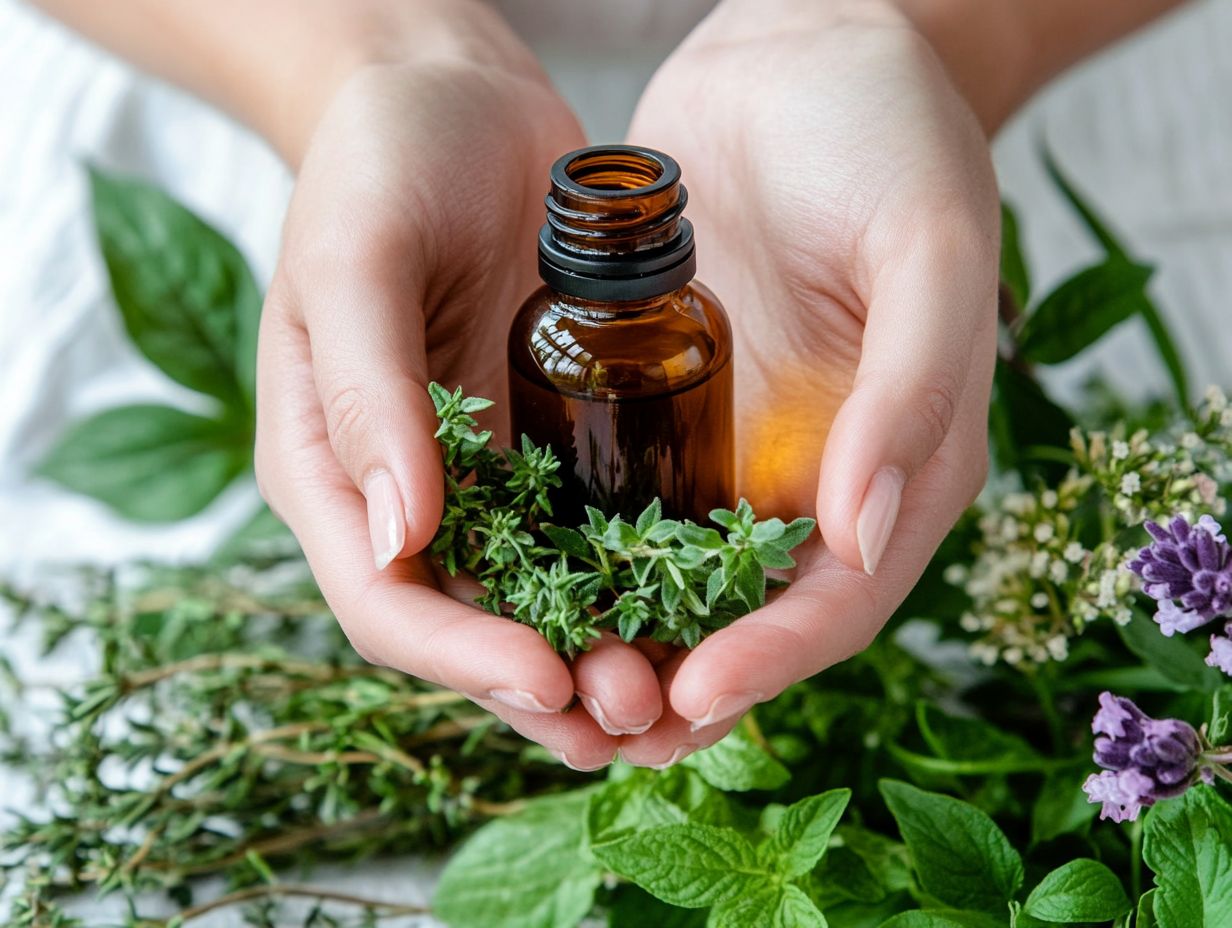
The signs of herbal remedy allergies can vary depending on the individual and the specific herb. However, common signs include:
- Skin rashes or hives
- Itchy or watery eyes
- Sneezing or runny nose
- Coughing or wheezing
- Nausea or stomach upset
Can Herbal Remedies Cause Anaphylaxis?
In rare cases, herbal remedy allergies can lead to anaphylaxis, a severe and potentially life-threatening allergic reaction. Always be cautious with new remedies. Seek medical attention immediately if you experience symptoms such as difficulty breathing, swelling of the face or throat, or a sudden drop in blood pressure after using a herbal remedy.
How Long Does It Take for Allergic Reactions to Herbal Remedies to Appear?
Allergic reactions to herbal remedies can appear immediately after use or take up to 24 hours to develop. It’s important to pay attention to your body’s response when trying out a new herbal remedy. Seek medical attention if you experience any concerning symptoms.
Are There Any Common Herbal Remedies That Cause Allergic Reactions?
Yes, some herbal remedies can cause allergic reactions. Echinacea, chamomile, and milk thistle are among the most common.
Other potential allergens include peppermint, ginseng, and St. John’s wort. Always read ingredient labels and talk to a healthcare professional before trying any herbal remedy.
What Should I Do If I Think I Am Having an Allergic Reaction to an Herbal Remedy?
If you notice symptoms of an allergic reaction after using an herbal remedy, stop using it right away. Seek medical attention as soon as possible.
Your doctor might suggest an over-the-counter antihistamine or a stronger medication to relieve your symptoms. It’s important to avoid that herbal remedy in the future.
How Can I Prevent Allergic Reactions to Herbal Remedies?
The best way to prevent allergic reactions is to avoid herbs you know you are allergic to. If unsure, always talk to a healthcare professional before trying a new herbal remedy.
Always read ingredient labels carefully. Start with a small dose when trying a new herbal remedy for the first time to see how your body reacts.




